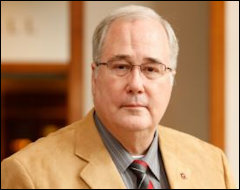 Three cheers for Robert Turner, a University of Virginia law professor, who went public last week with a full-throated defense of Thomas Jefferson. Once upon a time, the idea that Jefferson needed defending at the university he founded would have seemed ludicrous. But that’s before the forces of political correctness started taking over U.S. campuses, and before 469 university faculty and students blasted UVa President Teresa Sullivan for quoting Jefferson in a speech. Mr. Jefferson was a slave holder and a racist, and that’s all that needs to be said to brand him with infamy.
Three cheers for Robert Turner, a University of Virginia law professor, who went public last week with a full-throated defense of Thomas Jefferson. Once upon a time, the idea that Jefferson needed defending at the university he founded would have seemed ludicrous. But that’s before the forces of political correctness started taking over U.S. campuses, and before 469 university faculty and students blasted UVa President Teresa Sullivan for quoting Jefferson in a speech. Mr. Jefferson was a slave holder and a racist, and that’s all that needs to be said to brand him with infamy.
Last week, I defended Jefferson in the larger context of his contribution to advancing the ideals, however imperfectly he lived up to them, of liberty and equality of rights that we now take for granted. But Turner went a step further, describing Jefferson’s many actions to circumscribe slavery.
Yes, Jefferson was a slaveholder, Turner write in the Cavalier Daily. He inherited the bondsmen from his father and father-in-law, and it was illegal under Virginia law to free them without the permission of the governor on the grounds of extraordinary service. But in 1769, Jefferson drafted a statute permitting the manumission of slaves. That rule eventually would be enacted in 1782.
Jefferson also drafted an amendment, enacted in 1778, to prevent the import of new slaves into Virginia. He also supported the proposition that children born to slaves in Virginia in 1800 would be born free, although the notion was deemed so radical that he never submitted a bill to put it into effect.
As a member of the Second Continental Congress in 1787, writes Turner, Jefferson drafted rules for the governance of the Northwest Territories, which read, “There shall be neither slavery nor involuntary servitude in the said territory, otherwise than in the punishment of crimes….”
While Jefferson advocated the law permitting the manumission of slaves, it is widely noted that he never manumitted his own slaves. But Turner provides the rest of the story: “Jefferson did not free his slaves in his will, because he was deeply in debt and Section 54 of the Revised Code of Virginia of 1819 prohibited the manumission of slaves until creditors had been fully compensated. Freeing his slaves upon his death in 1826 was simply not a legal option.”
Although stifling, politically correct thinking is rampant at UVa, as it is at most universities, a measure of intellectual diversity remains. There don’t seem to be many outright conservatives (if there are, they are quiet) but professors are still comfortable standing up for old-fashioned liberal ideals of free speech and open-minded inquiry.
Turner expressed his willingness to debate the issue at an appropriate venue, UVa’s Jefferson Literary and Debating Society, with the “champions of censorship.” That’s a debate I would love to see.


